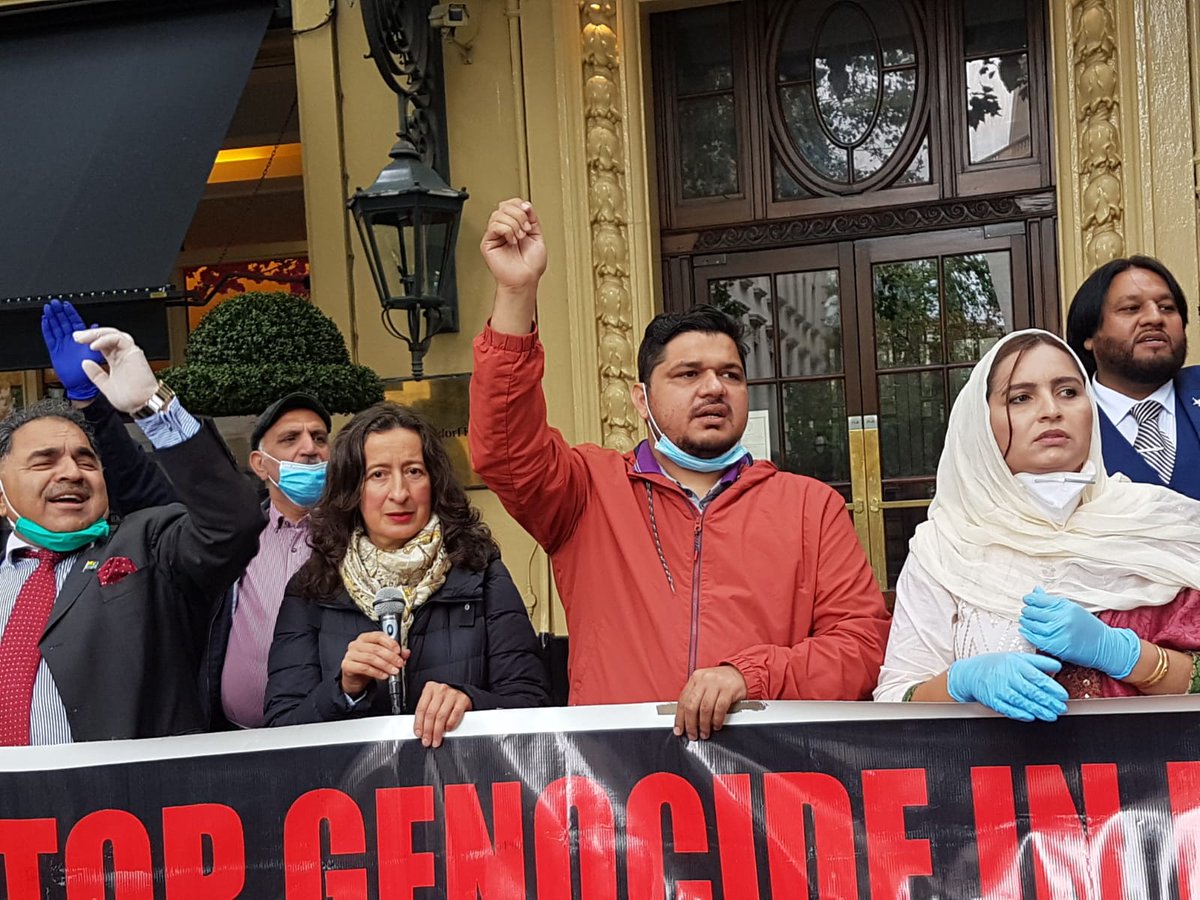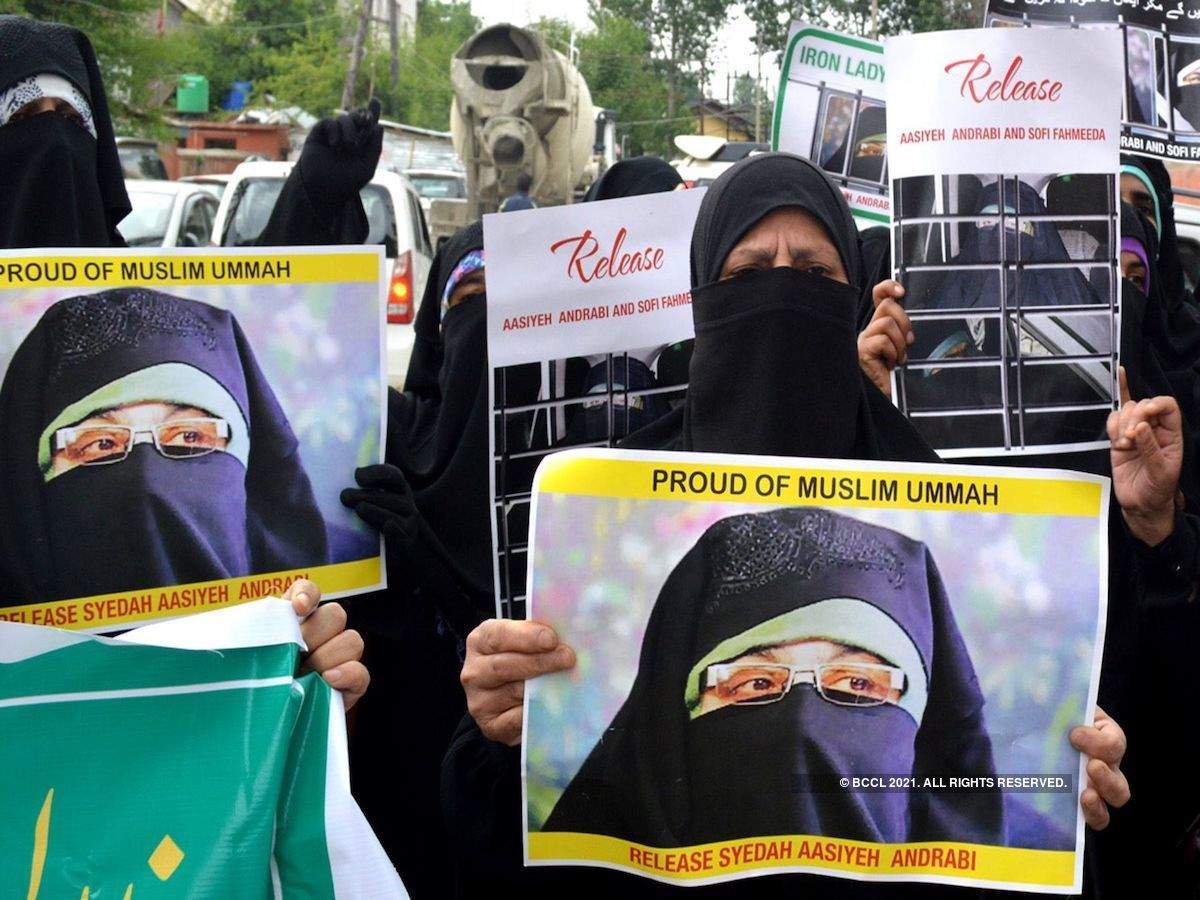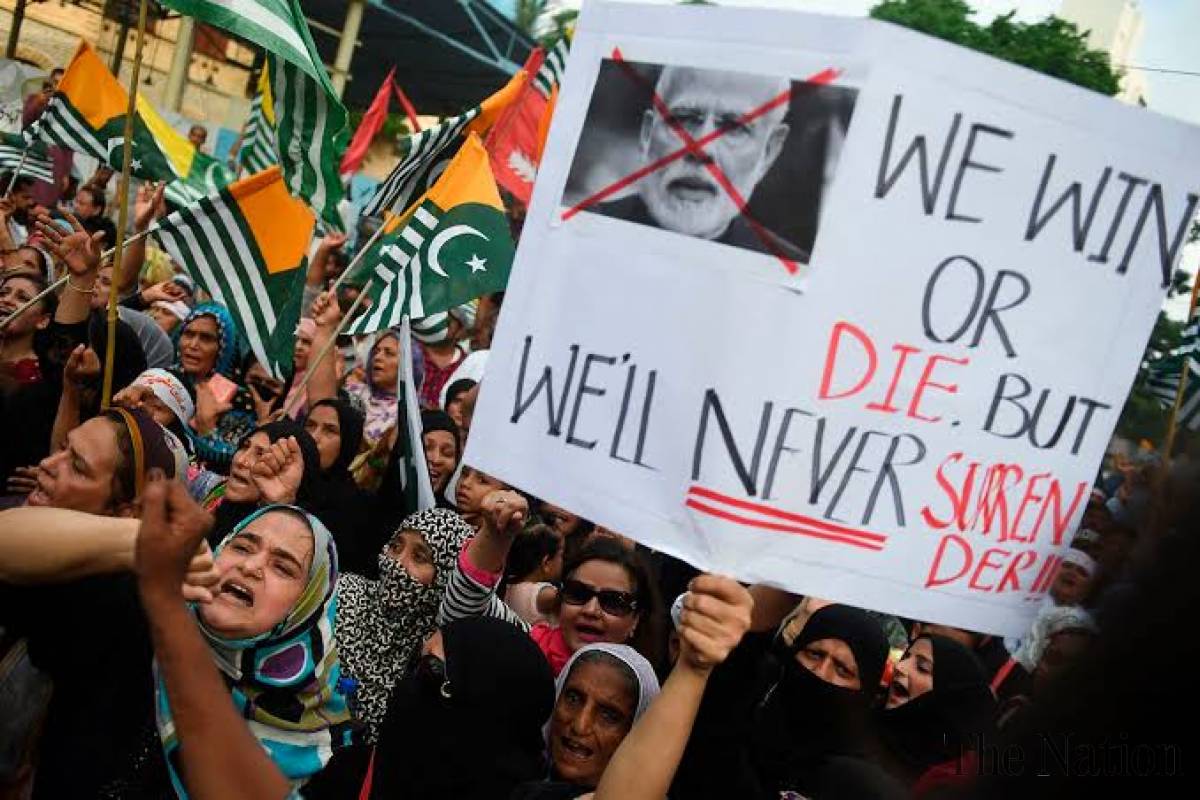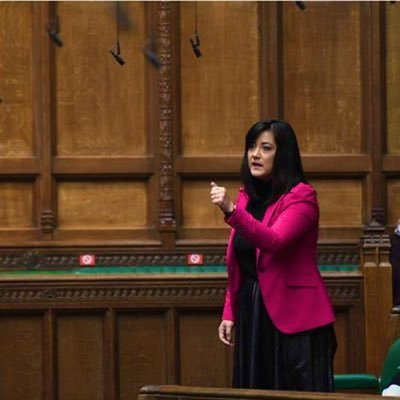In an unprecedented development, the House of Commons of the United Kingdom (UK) on January 14 held a debate on the “critical situation” in Indian Illegally Occupied Jammu and Kashmir (IIOJK), rejecting the argument that “Kashmir is an internal matter of New Delhi”. The debate on IIOJK, proposed by Labour MP Sarah Owen, saw all parliamentarians in agreement “to hold the Indian government accountable for its abusive behaviour, especially in the Kashmir Valley”.
MPs also hoped that British Prime Minister Boris Johnson, who is due to make a visit to India at some point, will raise the IIOJK issue with Prime Minister Narendra Modi and seek his reassurance that “all is being done to seek a permanent solution to the Kashmir dispute”. “I am sure we have caught ourselves at some stage moaning about the lockdown, but for the people of IIOJK, it’s not something new,” MP Owen said in her remarks. “There are people who are just concerned about human rights You don’t have to be a Kashmiri to care about their struggle for self-determination, their struggle to live safely and their struggle to live freely,” the MP said. She drew the attention of the House towards the barbarism of Indian troops in the occupied territory, saying there were numerous reports of Kashmiri women and girls being molested. “Senior officials in the Indian government have put on record their intentions to make Kashmiri women a part of this conflict.
MP James Daly, who is also a lawyer, said, “We have thousands of our fellow citizens who are from a Kashmiri background and have family members there, who are impacted and affected by their [Indian troops] acts on a daily basis. “I, as a lawyer, have got a long list of human rights abuses things like detention without trial. There are people in IIOJK who have been waiting 15 years for a trial, 15 years! There is no word from the international community in this respect.”
Further, MP John Spellar said, “India is a huge country with an incredible history and also limitless potential but that doesn’t mean we should not hold the Indian government to account for its abusive behaviour, especially in the Kashmir Valley. “We also reject this argument that Kashmir is an internal matter of India.” Spellar said, “India is trying to change the demography of Kashmir by amending the domicile law which is against the fourth Geneva Convention.”
Another MP, Sara Britcliffe said that she went to the Line of Control and was able to witness first-hand account of the situation, as “my constituents have been telling me for a long time of these, [which] are truly heart-breaking stories to hear”. “We are in the 21st Century and we need to be doing something about IIOJK, which is the most militarised zone in the world.”
MP Robbie Moore said that Kashmiris were living under heavy lockdown since August 5, 2019, when the special status of IIOJK was revoked by India. MP Paul Bristow said that the central point that “I want to make is what happens in Kashmir, matters here in the UK and I would urge the ministers to raise with their Indian counterparts the arbitrary detention of Kashmiri political leaders, 18 months arbitrary enforced lockdown on the Kashmiri people as well as the ban on access to 4G services and internet”.
MP Jim Shannon said the lockdown imposed by the Indian government since August 5, 2019 has destroyed the IIOJK economy. “The draconian Armed Forces Special Powers Act and Public Safety Act are being used by the Indian army to suppress the voices of the people of Kashmir.”
MP Nigel Adams, the foreign minister of state, said, “We believe that it is better for India and Pakistan to find a lasting political resolution to the situation that takes into account the wishes of the people of Jammu and Kashmir.” The human rights situation in IIOJK has been a particular concern to many in this debate and “we will raise these concerns with the Indian government”. “I know that the UK premier is due to make a visit to India at some point and I do hope that he will be able to raise the issue directly with Prime Minister Modi and seek his reassurance that all is being done to seek a permanent solution to the Kashmir dispute.”
Stephen Kinnock, the shadow foreign minister, termed the Kashmir conflict the longest unresolved conflict on the agenda of the United Nations. “As many as 95,000 people have been killed in the past 30 years,” Kinnock said. “The curfew imposed by India in IIOJK has had a profound and far-reaching impact on every aspect of life in Kashmir, including health services, school closures and media freedom.”

Tehreek-e-Kashmir (TeK) UK President Raja Fahim Kayani said, “The debate on Kashmir in the House of Commons is a huge disappointment to India on a diplomatic level as India was confident its war crimes committed by the Indian army in IIOJK would go unnoticed.” Kayani said that they were indebted to all British MPs for speaking about Kashmiris woes and condemning human rights violations in IIOJK.
In a statement, the Malaysian Consultative Council for Islamic Organizations (MAPIM) has also condemned the human rights violations of Kashmiris in Indian illegally occupied Jammu and Kashmir (IIOJK) by Indian forces. The Council said that India must be held fully responsible for the crimes being committed against humanity in IIOJK. “India has no right to abrogate Kashmir’s autonomous status and it must refer to the UNSC resolution for a plebiscite to be conducted for the people of Kashmir to decide their own future,” the MAPIM said. Voicing concern, the Malaysian council said that the forced demographic change to alter Kashmir from a Muslim majority populated territory to a Hindu dominated region is a dangerous path.
The MAPIM has called upon the United Nations (UN) to intervene in the case of Kashmiri activist and political leader, Asiya Andrabi who is incarcerated in the Tihar Jail in India. The council also demanded that the concocted charges against Andrabi be dropped and she should be released unconditionally. Andrabi has been under illegal and inhuman incarceration for more than 15 years on fabricated charges under draconian laws aimed at perpetuating India’s occupation of IIOJK through brutalisation of Kashmiri people.
In an exclusive interview with ‘a News’, a Turkish news channel on January 06, Prime Minister Imran Khan stated that “the Rashtriya Swayamsevak Sangh (RSS) inspired ruling Bharatiya Janata Party (BJP) led by Prime Minister Narendra Modi had been implementing a programme against Muslims and all other minorities in India as well as in Indian Illegally Occupied Jammu and Kashmir (IIOJK)”. The premier said the RSS was founded during 1920 and its founding fathers had been directly inspired by the Nazi party, and openly admired its racial and extremist policies. “Pakistan will never forget the Turkish and Malaysian support on Kashmir cause after the Indian illegal act of August 5, 2019”, PM added. Prime Minister Imran Khan called upon the international community to take action on the “well-documented human rights violations” being committed with impunity by the Indian occupation forces against innocent Kashmiri men, women and children.
The RSS philosophy led to racial supremacy as even Mahatma Gandhi was assassinated by an RSS zealot. But when Modi came to power, he responded to a programme against the Muslims as is evident from his tenure as chief minister of Gujarat where hundreds of Muslims were massacred and made homeless by fanatic Hindu supremacists.
The RSS followers believe that India is a country only for the Hindus to live in. Such a situation is not only dangerous for the Muslims, but also for the other minorities in India. RSS-BJP policies against the Muslims and Christians have a historic anchorage—avenging their rule over India
Modi is responsible for the tense ties between Pakistan and India. Modi’s whole election campaign was based upon whipping up jingoistic and anti-Pakistan sentiment. The Kashmir issue is a lingering dispute between Pakistan and India, and the United Nations Security Council promised that Kashmir would be provided an opportunity to decide about its future but India is the main hurdle in conducting a referendum. Modi government, after the illegal and unilateral action of August 5, 2019, is trying to change the demography of Kashmir to reduce the Muslim majority in the valley.
Senior Kashmir leadership has been detained by India. “War is not a solution of dispute between two nuclear powers and, therefore, Pakistan is sensitising the world community about Kashmir dispute and demands to conduct a referendum as promised the world body to Kashmiris.”

On January 5, 1949, the United Nations Commission for India and Pakistan (UNCIP) had adopted a resolution that embodied the principle of right to self-determination for the people of Kashmir. The resolution mentions that the question of accession of Kashmir will be decided through democratic method of a free and impartial plebiscite.
President Arif Alvi in his message said that Pakistan would continue to extend all possible support for the just cause of the people of Jammu and Kashmir till the realisation of their right to self-determination in accordance with the UN Security Council resolutions. “The right to self-determination is a vital component of human dignity. Negation of this right is the negation of human freedom, Universal Declaration of Human Rights, and the UN Human Rights Covenants,” he said. “India is the biggest violator of this inalienable human right,” he added. “The people of IIOJK”, he said, “were being subjected to collective punishment by the Indian occupation forces, which had turned the territory into the largest militarised zone in the world and were seeking to change the demographic structure of the occupied territory in violation of the international law, including the 4th Geneva Convention”.
India is committing war crimes in IIOJK by violating Article-82 (2b, VIII) of the Rome Statue of International Criminal Court (ICC) and article 143 of Geneva Convention-IV.
Several senior Muslim Kashmiri leaders, including Syed Ali Gilani and Mirwaiz Umar Farooq, are also under house detention, while other prominent leaders, such as Asiya Andrabi, Muhammad Yasin Malik, Shabbir Ahmed Shah and Masarrat Aalam Mutt are in New Delhi’s notorious Tihar Jail. Andrabi, like other Kashmiri leaders has been illegally arrested over malicious, false and fabricated charges by the Indian government through invoking draconian laws promulgated in IIOJK. Dr. Asiya Andrabi is the founder of Dukhtraan-e-Millat and is facing inhuman treatment by the Indian government during imprisonment with deteriorating health conditions. It is feared that the Indian government is setting the stage for judicial murder of Asiya Andrabi in the coming weeks. The Indian government arrested Asiya Andrabi and her associates Fahmida Sufi and Nahida Nasreen in Oct 2016. Their sin was to raise the voice for the rights of women and the right of self-determination for the people of Kashmir. The Indian government charged them with acts of terrorism and other draconian laws under the Public Safety Act. Later, they were transferred to Tihar jail.

Under the Geneva Convention IV, Article 49, it is prohibited to transfer an individual or group of “protected persons from occupied territory to the occupying power, regardless of their motives”. India had violated article 49 multiple times by transferring Kashmiri leaders including Asiya Andrabi, her husband Dr. Ashiq Hussain Faktoo and other leaders from Kashmiri prisons to the notorious Tihar Jail. Dr. Faktoo is in Indian prison serving life sentence for 27 years.
India is also violating Article 76 of Geneva Convention IV, while not allowing the delegate of International Committee of the Red Cross (ICRC) to visit the prison. This Article also stipulates that women shall be confined in separate quarters and shall be under the direct supervision of women. According to Dr Shireen Mazari, Minster for Huma Rights, this is the binding duty of India as the signatory of International Human Rights Law and Humanitarian Law of the United Nations World Summit in 2005.
Against all norms, the Indian Supreme Court defined the term “death imprisonment” as imprisonment till death of the individual during a verdict in 2012. Presently, Indian government is using this verdict to penalize Asiya Andrabi to kept her behind bars till her death. It is akin to judicial murder of an individual. International human rights organizations need to come forward and play their role to end this draconian law and save the life of a human rights and women rights defender of IIOJK.
The designation of Pakistan as a “country of particular concern” by the US under its “International Religious Freedom Act of 1998” is completely against the realities on the ground and raises serious doubts about the credibility of the exercise. Pakistan and China were among several countries designated by the State Department as countries of “particular concern” regarding religious freedom on the recommendation of the US International Commission on Religious Freedom (USICRF). However, the State Department rejected the proposal to place India in the list as well.
The findings and recommendations of the US Commission on International Religious Freedom as well as the US Congressional hearings on the maltreatment of minorities in India and the violation of religious freedom all over the country including in the Muslim-majority IIOJK were mischievously ignored by the US State Department. The glaring omission of India, where the RSS-BJP regime and their leaders openly disregard religious freedom and discriminate against minority communities in an institutionalised manner, is unfortunate and puts the credibility of the US report into question.
Pakistan has rejected the US State Department’s “arbitrary and selective assessment” on religious freedom, terming it counterproductive to promote bilateral relations. Pakistan and the US have been constructively engaging on the subject at the bilateral level, a fact regrettably overlooked by the US.
During the year 2020, the Indian Army violated the Line of Control for more than 3,000 times. As a consequence, 30 innocent Pakistani civilians were martyred and more than 180, including over 90 women and 67 children, were injured or became disabled all Muslims. It was the bloodiest year in terms of the Indian brutalities.
Incidents of killing of three innocent young Muslim labourers at the hands of Indian Army in Shopian district of occupied Kashmir and later placing weapons on their corpses to declare them militants and terrorists, as exposed by the Kashmir police after an in-depth investigation, should serve as an eye-opener for the United States. And the United Nations should constitute a commission of inquiry to visit IIOJ&K and look into human rights violations there.

India has been using the tools of oppression and ill-treatment to spread a sense of fear among unarmed and innocent Muslim people of IIOJK for the past over seven decades. Thousands of Kashmiris including innocent youth, members of civil society, journalists and Kashmiri leaders remain incarcerated in Indian prisons, several of them at secret locations and aloof from their families. The Indian forces still operate in the illegally occupied territory with complete impunity under draconian laws like Public Safety Act (PSA) and Armed Forces Special Powers Act (AFSPA).
Systematic demonization, dispossession, marginalisation and targeted violence against Muslims using the communal slur of “love jihad” in Hindutva-inspired India has become commonplace. It is no secret that attacks by cow vigilantes and mob lynching of Indian Muslims take place regularly, with complete impunity for the perpetrators. State complicity in organized violence against the Muslim minority in India is a matter of record.
Recently, at the 47th session of the Council of Foreign Ministers (CFM) held at Niamey, the Organization of Islamic Countries (OIC) called upon the Indian government to take immediate steps, “[It also calls upon New Delhi to] fulfil its responsibilities under the Universal Declaration of Human Rights and other international instruments including the recommendations of the OIC.”
Silence of the so-called champions of human rights is rather intriguing after the Indian occupational army confessed that it killed ordinary Muslim civilians in fake encounters in Indian illegally occupied Kashmir, and later declared them terrorists. Most of the encounters taking place in the occupied territory are fake. It is no longer a secret that the Indian Army is engaged in naked terrorism and ethnic cleansing of innocent Kashmiri Muslims in the occupied territory.
The United Nations must honour its commitment made 72 years ago, and the global community must not shy away from its responsibility towards the oppressed people of IIOJK. It is time for the world to ensure that the Kashmiris get their right to self-determination. Despite suffering brutal Indian occupation for over seven decades, the Kashmiri people remain steadfast generation after generation in their demand for their inalienable right to self-determination. Regrettably, this right of Kashmiris is being brazenly denied by India.
The United Nations, especially the UN Security Council, bear the responsibility to ensure fulfilment of the promise to the Kashmiris. It is time for it to appoint a special representative on Kashmir and initiate a P-5 process for resolving the matter through a UN supervised mechanism for exercise of right to self-determination.




